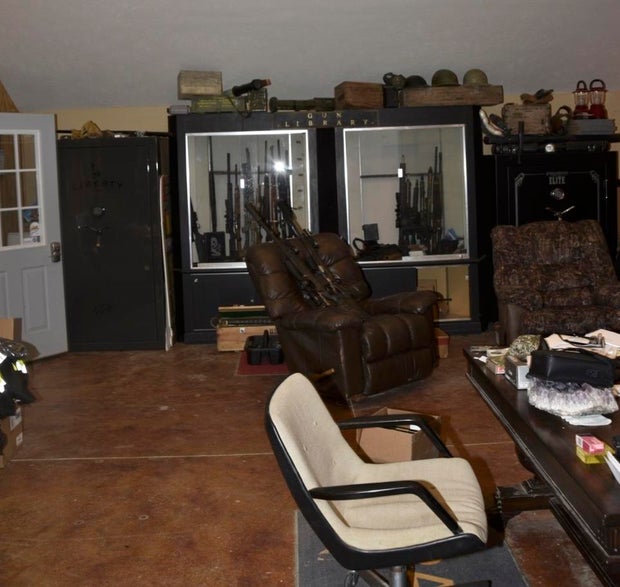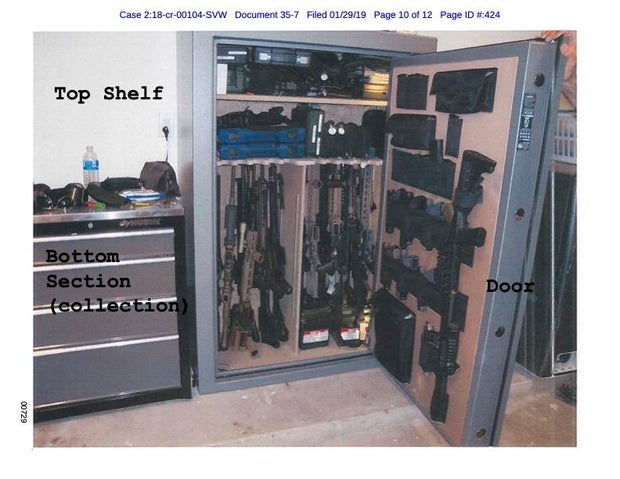Police illegally sell restricted weapons, supplying crime
Adair, Iowa, had a population of 794. So, it seemed suspicious when its three-person police department asked regulators to buy 90 machine guns, including an M134 Gatling-style minigun capable of shooting up to 6,000 rounds of ammunition every minute.
Federal agents later discovered Adair's police chief, Bradley Wendt, was using his position to acquire weapons and sell them for personal profit. A jury convicted Wendt earlier this year of conspiracy to defraud the United States, lying to federal law enforcement and illegal possession of a machine gun. Wendt is unapologetic and has appealed his conviction.
"If I'm guilty of this, every cop in the nation's going to jail," Wendt told CBS News just days before a federal judge sentenced him to a 5-year prison term. Wendt's crimes appear to be part of a nationwide pattern.
A CBS News investigation found dozens of law enforcement leaders — sheriffs, captains, lieutenants, chiefs of police — buying and illegally selling firearms, even weapons of war, across 23 U.S. states, Puerto Rico and Washington, D.C., from the Deep South to the Midwest, Northeast and California coast.
A nationwide review of government audits and court records over the last 20 years uncovered at least 50 cases of police illegally selling their weapons online, through dealers, out of their homes or the back of their cars. In many cases, the weapons were sold to gun enthusiasts, often at steep markups as high as 10 times what they were bought for.
In several cases, the guns wound up in the hands of violent felons and were used to commit crimes including drug trafficking, international arms dealing and, in one case, the fatal shooting of a 14-year-old boy attending a high school football game.
In 2011, federal agents busted a smuggling ring out of New Mexico involving a police chief, mayor and village trustee who delivered automatic firepower and tactical gear to a Mexican cartel.
A decade later, prosecutors uncovered a multistate conspiracy linking a sanctioned Russian arms dealer with three police chiefs, one sheriff and a Delta Force veteran who sold machine guns directly to a criminal trafficker. All of them pleaded guilty. An additional alleged co-conspirator, who worked as an intelligence analyst for the U.S. Department of Homeland Security, denied wrongdoing and his case is proceeding to trial.
Nearly 26,000 guns were traced from American crime scenes back to a government agency, law enforcement or the military between 2017 and 2021, the most recently available data, according to a report by the Bureau of Alcohol, Tobacco, Firearms and Explosives. It isn't known how many of those were lost, stolen or sold. However, when government auditors investigated firearms that law enforcement agencies reported missing over a 15-year period, the General Services Administration Inspector General found that more than two-thirds had not gone missing at all but, rather, were inappropriately sold or traded —including Uzis and grenade launchers that were never recovered.
Meanwhile, a separate Government Accountability Office audit in 2018 found $100 million worth of guns and ammunition bought by U.S. Immigration and Customs Enforcement was unaccounted for. In response, ICE said that it improved how it would keep track of its inventory going forward; there was no follow-up about the weapons that were already missing. ICE did not respond to CBS News' request for comment.
Of the 58 cases CBS News identified where law enforcement officers were criminally charged with illegally selling their weapons, 56 of them either admitted guilt or were convicted; two have denied wrongdoing in ongoing cases.
Those cases are just the tip of the iceberg, according to interviews with half a dozen former Bureau of Alcohol, Tobacco and Firearms agents who worked directly on these investigations. Several career agents shared anecdotes about letting police departments off with warnings after repeatedly finding their service weapons in the hands of private citizens. The agents explained that prosecutors have been generally reluctant to charge these cases, and the bureau stated that "it is our goal to educate, not investigate," according to a 2017 law enforcement memo obtained by CBS News.
"We're not looking to prosecute fellow law enforcement officers," said Eric Harden, former special agent in charge of the ATF's Los Angeles field division.
Harden authored the 2017 memo, which flagged a "growing trend" of "officers purchasing and then selling [restricted] firearms...for profit." The memo warned that anyone doing this was functionally acting as a straw purchaser in violation of at least two federal laws.
Harden told CBS News that if officers persisted after being warned, or if their weapons were traced to a crime, they should be held accountable. "If we don't do this, then it'll be turning a blind eye and saying officers are above the law."
Harden wrote the memo after his intelligence unit traced an outlawed pistol seized in a narcotics bust to a recent purchase by a beat cop in Pasadena, California. Now retired, Harden still remembers that officer crying on his shoulder when federal agents showed up to arrest him for illegally selling more than 100 weapons out of his home. The officer argued at the time that he didn't know he was breaking the law, but he later pleaded guilty. He served less than a year in federal prison and paid a $10,000 fine but was allowed to keep his Porsche and Alfa Romeo.
On the other side of LA County, a U.S. Customs and Border Protection officer, with secret-level security clearance, was operating an even more egregious gun-running scheme that went on for 20 years. He too eventually pleaded guilty, in 2019, after an undercover agent busted him selling weapons out of the trunk of his car. His stockpile at the time totaled more than 250 firearms, including 41 machine guns and two short-barreled rifles.
The officer "betrayed his oath to uphold the laws of the United States solely to put more money in his pocket," the U.S. Attorney said in announcing the news of the officer's prison sentence.
Several cases involved sheriffs and police leadership who used their positions in law enforcement to gain access to military-grade machine guns, short-barreled rifles and explosive devices like grenades, and then sold them in violation of federal law.
Although the Second Amendment guarantees the right to bear arms, there are limits to the kinds of weapons people are allowed to possess. Post-1986, these weapons — known to the ATF as Class 3/Title II and to the gun industry as "posties"— have been restricted for official government use because of their deadly firepower. Many of them are battlefield weapons used by U.S. and NATO forces in conflict zones. Some ammunition can take out a helicopter or blow straight through an armored tank followed by a concrete building, out the other side, then explode, hitting targets 18 football fields away. These guns can spew hundreds of rounds each minute, faster than the speed of sound.
"Congress knew almost 100 years ago, in the days of Al Capone, that fully automatic weapons were unusually dangerous," ATF Director Steven Dettelbach said a public address on Feb. 28, 2023. "They have no place in our communities."
The government loophole, however, has been exploited by opportunists who recruit law enforcement conspirators to help them bypass the American machine gun prohibition, according to law enforcement records and court filings obtained by CBS News that include text messages, videos and wiretapped audio conversations between people who were either convicted of or admitted participation in these schemes.
CBS News found a trail of activity in social media videos and online web forums frequented by firearm aficionados discussing how to entice law enforcement allies into this illicit trade, which can be highly lucrative. Amid a series of online conversations reviewed by CBS News, one poster suggested that after law enforcement acquired a $10,000 machine gun through the federal approval process, it could be worth $75,000 because it would be free of red tape. Wendt, the Iowa police chief, for example, at times earned more than a 90% profit margin, according to court records.
"Here is a breakdown of who signs for me," advised another online user, identifying one police chief, one sheriff, one SWAT officer and one deputy sheriff with whom he said he attended high school.
For police departments to get ahold of such high-powered weaponry, each one needs permission from the ATF. Even though it has been the law for more than three decades, the ATF only started vetting every machine gun application for the first time in January 2023 to confirm that a legitimate government agency was making the request.
According to interviews with half a dozen longtime ATF officials who worked directly on these cases, the bureau typically does not assess the appropriateness of the weapons for a department or track where they end up.
"There's no audits," said former Supervisory Special Agent Tim Graden, who worked at the ATF for more than two decades before retiring in 2022. "There was no second-guessing whatsoever. They weren't really — I don't want to use the word concerned, but I can't think of a better one."
The Bureau of Alcohol, Tobacco, Firearms and Explosives declined requests to comment.
It's unclear how pervasive this is nationwide, but in Iowa alone over the past five years, the ATF did not deny a single law enforcement request for machine guns "based on suitability (or lack thereof)," according to court filings. By 2023, there were more than 1,200 machine guns registered to law enforcement across the state.
To find out how that compares to other places, CBS News filed a series of Freedom of Information Act requests with the ATF for details about the high-powered arsenal it's granted to public law enforcement over the past decade. However, the bureau denied those requests, stating that it considers that private tax information exempt from public disclosure. Last week, CBS News filed a lawsuit for the information.
The proliferation of this high-powered weaponry is likely to become increasingly more relevant when President-elect Donald Trump takes office. During his first administration, Trump revoked an Obama-era executive order restricting the transfer of military equipment from the Defense Department to law enforcement nationwide. The Trump transition team did not respond to a request for comment.





